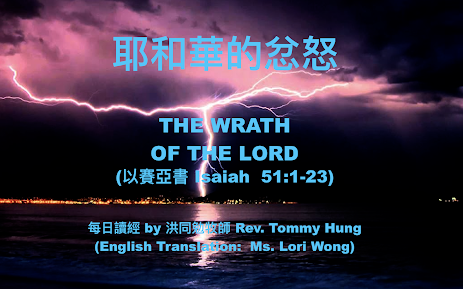求主指教我曉得分辨潔淨和污穢, 使我可以選擇
May the Lord give me guidance in discerning between clean and filth so that I can make a choice.
出來
GO OUT
經文: 以賽亞書 Isaiah 52:1-12
釋義: 本章結構比較鬆散。最後一段(13~15), 是第四苜僕人之歌的開始(以五三12為結束)。第一節的句法:「興起、興起」(五一9,17), 披上、穿上能力衣服(五一9)與上一章相同, 但內容卻不相同。接著的三段(1~6,7~10,11~12), 缺乏邏輯性的關係, 有各自的主題。唯一可以連繫的, 就是用不同的神學觀念, 預言將來從被擄歸回。
Insight: The structure of this chapter is fairly loose. The last segment (13 – 15) is the beginning of the fourth Servant Song (which ends at 53:12). The sentence structure of the first verse - “Awake, awake” (51:9, 17), “put on strength (51:9)” – is similar to that of the previous chapter; however, the content is different. In the three segments (1-6, 7-10, 11-12) that follow, there is a lack of logical relationship; each segment has its own theme. The only thing that tie them together is that they both prophesied the return from captivity using different theological concepts.
● 無價被擄、被贖(1~6) 以色列民是屬神的,他們被擄到異邦(本段三次提到被擄)並非因為被神出賣(四五13五十1),神毋須用贖金贖回他們。埃及、亞述、巴比倫先後無理苦待以色列,終必受制裁,神要為祂的名救贖以色列民,顯出祂的能力。
Taken away and Redeemed for nothing (1 – 6) — The people of Israel belong to God. They were taken away to foreign nations (mentioned being taken away 3 times in this passage) not because God betrayed them (45:13, 50:1). God didn’t need to redeem them with ransom money. Egypt, Assyria, Babylon had tormented them for nothing at different time periods, and they will be punished in the end. For the sake of His name, God will save Israel to show His power.
話雖如此, 神並非毫無條件、單方面的贖回以色列。他們必須「興起, 披上能力、穿上華美衣服」, 寓意要下定決心, 奮發圖強, 積極向善; 還有, 「要解開頸項的鎖鍊」, 意思是掙脫綑綁他們的罪。
Nevertheless, God will not redeem Israel unconditionally and unilaterally. They must ‘be awake, put on their strength, and put on their beautiful garments’ - symbolizing the determination to work diligently to be strong and to fear God - and to ‘loose the bonds from their neck’, meaning to break free from the chains of their sins.
● 報救恩佳音(7~10) — 報告被擄將歸回的信息, 當然是佳音, 也難怪這人的腳步佳美。但是保羅引用這節聖經, 說明真正的救恩佳音是從以賽亞那時的吩咐人「聽」佳音(8), 成為「親眼看見」(8~10)。並且不單以色列人看見主(耶穌)的救贖, 地極萬國都看見救恩。而傳這個佳音、好信的使命, 由先知輾轉交給信徒去完成(羅十15~18)。
Publishing the good news of salvation (7 – 10) — For the person who brings such good news as the upcoming return from captivity, no wonder his feet are beautiful. However, when Paul quoted this verse, he made it clear that the true good news of salvation comes from Isaiah asking people to ‘listen’ to the good news (8) and it turns into “for eye to eye they see” (8 – 10). Also, not only will the Israelites see the salvation of the Lord (Jesus), so will all the nations and all the ends of the earth. And the mission to spread this good news is passed from prophets to believers for us to complete (Romans 10:15 – 18).
● 離開不潔(11~12) — 離開巴比倫除了是政治和經濟的轉型外, 更是屬靈生命的更新。神並沒有吩咐他們拖金帶銀地回到巴勒斯坦重建家園(雖然這是必然的事), 卻叫他們「不要沾不潔淨的物……務要聖潔」, 從其中「出來」(本段提到三次)。
Leaving unclean things (11 – 12) — Apart from being a political and economic transformation, getting out of Babylon is a spiritual revival also. God is not asking them to return to Palestine to rebuild with gold and silver in tow (although this is inevitable), but to “touch no unclean things…..purify yourselves” and “go out from there” (mentioned 3 times in this message).
我們留存的東西, 往往有一半是不明不白的。松鼠藏起堅果過冬,還說得過去; 狗藏骨頭或許也有道理; 但人積存東西, 大半是出於劣根性──例如吝嗇、錙銖必較、對前途的顧慮、對物質支撐的依賴、以及頑固守舊不敢革新等弱點。有些也許是由於懶惰; 要做到不把東西積存, 非敢作敢為不可。
With the things we keep, about half of them we do so for no good reason. It is understandable that squirrels bury nuts to prepare for winter; it may also makes sense for dogs to hide bones; but people hoard things mostly due to bad habits – such as being stingy, calculating, apprehensive about future prospect, dependent on material things, and weaknesses such as stubbornness and fearful of adapting to change; perhaps part of it is due to laziness. In order to steer clear of hoarding, one has to be audacious.
你要出來! 從事奉怠慢、靈修消極的不潔淨心靈出來。
You have to go out! Go out from the unclean heart of apathetic serving and negative attitude towards devotion.
每日讀經 by 洪同勉牧師 Rev. Tommy Hung
(English Translation: Ms. Lori Wong)

